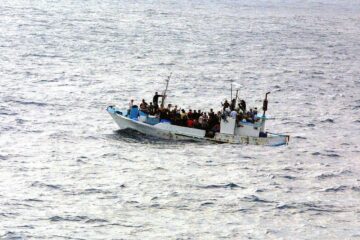![]()
Introduction:
The basic meaning of “child asylums” is a place or area of people where protection and shelter to children are given. It is not for orphans but more or less like refugees who have had reasons to leave their homes and have no parents or have no sources where they can be kept or can stay as family. These places were also a home for children who were mentally ill or mentally unstable. United Nations High Commissioner for Refugees (UNHCR) are the ones who take care for the people who are having reasons to take refuge such as they helped refugees in Syria where they immigrated to the United States for better life and standard of living.
India was never a party which regarded to have many reasons to keep any specific laws for refugees but it does hosts it’s neighbours regarding so. As we have always heard the stories of Mr Dalai Lama in 1959 who took refugee in India when he escaped from the Tibetan lands, as well as, Rohingya Muslims were also given refugee in India North-Eastern Lands. The Indian government have always been very respectful in areas regarding giving refugee. The Indian Foreigners Act, 1946 applies all the people who come under the class of non-nationals including refugees and asylum seekers and refugee policy which is determined on such “ad hoc” principle.
Fundamental Rights in the Constitution
The Indian Constitution pledges certain rights to every child present in the country that there should be Right to Education that is compulsory and free education which comes under Article 21(A) from groups of 6-14 years of age. Also, Article 24 of our Constitution that child labour and child trafficking which was quite famous in India for exploiting children and not giving them the money for their work and making them do hazardous jobs comes under the violation for such Article 24 of the Indian Constitution.
Directive Principle of State Policy in the Constitution
- Article 39 states how the children should be protected from abuse and should be given opportunities with freedom and dignity and should be protected from abandonment.
- Article 46 states how the weaker sections should be provided with the best of amenities present within a country and should not have to face issues with no education.
- Article 45 states how these should be provided with adequate childhood care and educational aid for a better life and standard of living.
- Article 51 and Article 51A states how there should be fostering and respectful nature towards international law and treaties these also cater for the betterment of refugees and their children or orphan refugee seeking children who deserve to get a better life. Article 51A if these children have they had guardians then they can be given aid for providing their children with a certain amount of education so they can lead a better life in future.[1]
UNHCR and Indian Relations
The United Nations High Commissioner Refugee has been working here in India from 1981. The refugee status in India has been only till now given to Tibetans and Sri Lankans by the Indian Government. The Refugee Committee for UN is the one who is responsible for registering for nationals who are from Neighbouring countries. In 1992, UNHCR started it’s first ever office in India that was in New Delhi where people were being registered as refugees under certain laws and rights with proven and shown evidence of documents and with their legitimacy.
The UNHCR has also worked with other countries which are still developing and their nationals come to India for taking refugee from the conditions they are being posed to face since there no democratic or stability in the governments or even in whichever authority is valid there. The United Nations High Commissioner Refugee has another committee within the group of the committee under United Nations where such children are taken care for and their rights are taken as a big deal.
Issues
The United Nations High Commissioner Refugee did focus on basically child asylum seekers but all of the refugees. They have made laws and regulations which caters all of them as one. According to the reports of UNHCR, they clearly state that till now there is no particular case in India where children who are refugees have not been provided with the education or even have been bullied or assaulted back in educational institutions. But still, there were no amendments made for these poorly treated children who already had faced a lot back when they had to leave their places to get refugee from other countries.
In India, the refugees have continued their access to stay all over India without any obligations. These people can approach for the visa, or even long term visa to keep staying back in India. These people are also given refugee if they or any family member is suffering from a disease which cannot be treated by the country where they already resided.
The Indian Government has made amendments and have allowed all refugees to make use of each and every resource or opportunity they can for their development while within staying in the country. These resources are for the development of the refugees and citizens, these are, legal aid, education, mental and physical health. It is true that there is a scarce amount of resources but making a sustainable usage so that future, as well as the current generation, can make use of such for their betterment and development can not be blamed for ruining resources but many times due to such, refugees have to face violation for using these resources and are the ones facing disputes. The people of the country also make gender and sexual tantrums towards these refugees which makes their standard of living worsen day by day.
To conclude with this sub-topic, we know, child labour is a very common practice that has been going on since the earlier times so it is not shocking to know that these refugee children are protected and shelter within the asylum shelters. These asylum shelters are also sometimes very shallow as well as exploitive and not the best place for getting a better life and development for these children, since many times these shelters are also used for child trafficking.
United Nations Children’s Fund (UNICEF)
The United Nations Children’s Fund is a committee working for the better standard of living and developmental aid which is provided to the children all over the world. There are 192 countries which have signed the agreement with the UN regarding taking care of each and every child and making sure they work for society, especially for children’s welfare. The UNICEF mentions in their website reporting what are the important welfare measures each and every country needs to take to make sure the children are well protected. These measures were sanitation, hygienic methods, access to clean water, free and fair education, supporting the mental health, hopes to mentally ill children who need help the most and are helpless themselves.[2]
Committee on the Rights of the Child
This committee was created under UN Conversion where it created an international expert body to look after children’s rights and awareness of principles of this treaty. This is a list of rights which are supposed to be provided to every child all around the world whether a refugee or not. This protects the children and to provide them for a better standard of living and for best help with the financial help aid to manage their future well. There are three parts under this CRC. These three parts are; Operational Articles, Enforcement and Administrative Issues. It contains 54 articles which ensure children rights.[3]
Asylum Seekers
These children are the ones who are waiting for their status of decision from the government to accept them as refugees or asylum seekers. As soon as they are accepted they get rights entitled to the citizens of that particular country and can easily be entitled to such rights for their development. The children who join a host country as a refugee without any guardians and parents are the most unable to be taken care of since they are considered under orphans and are only provided shelter and protection unless someone from the host country does not adopt them and promises them to provide good educational aid and a better life.
The girl child is more prone to sexual exploitation and physical abuse of health. These children also go through factors like hunger, no health aid, homelessness, sexual exploits and labour exploitation. Due to such, these children are going through mental disorders which are permanent like Post-traumatic stress disorder, anxiety and depression. Even they go through chronic illnesses those are heart disease and diabetes etc.
Recommendation from UNHCR
The UNHCR recommends the Indian Government:
- To take steps for more elaborate measures for children who are under refugees and are not provided with adequate aid for health and education.
- To registrar children asylum seekers easily without years of pending application of their status.
- Better settlement opportunities, health and educational aid and away better standard of living overall for refugees and being respectful to them due to displacement and their mental trauma for the loss of everything they have dreamed of.[4]
Case Laws
M.S. v. Slovakia and Ukraine[5]
The person who was a refugee he complained to the Slovakian officials, having captured him soon later when he crossed from Ukraine, had neglected to educate him regarding the purposes behind his capture, infringing upon Article 5 § 2 of the Convention. They had then returned him to Ukraine, where he was kept in lacking conditions in negligence of his supposed status as a juvenile, in penetrating of Article 3. He was unable to partake successfully in the procedures concerning his detainment and had at last been gotten back to Afghanistan without a satisfactory appraisal of the dangers he had looked there, in the break of Article 3, Article 5 §§ 1, 2 and 4, and Article 13 of the Convention. In conclusion, he claimed, under Article 34, that an NGO delegate had been denied admittance to him in Ukraine, keeping him from housing an application for a broken measure with the Court.
Y.B. and N.S. Belgium
The denial of refugee taking visa by the fostering arrangements by Belgian and Moroccan couple. The Committee, acting under article 10 (5) of the Optional Protocol, is of the view that current realities of which it has been advised sum to an infringement of articles 3, 10 and 12 of the Convention.
Conclusion
To conclude with, we would like to address that the Government of India needs to look for the better provisions which can cater to every refugee as well as every age group of the society with better living opportunities. These aid provided should be given free of cost since these displaced people have lost a lot in their lives as well as being refugees is a traumatic experience for them since they are kept excluded from the societies. Even though India has provisions which cater to the weaker sections but they should be differentiated based on their situation as well as the condition and not their last names.
References:
[1] Children in India and their Rights by Dr.Savita Bhakhry (https://nhrc.nic.in/sites/default/files/ChildrenRights.pdf)
[2] United Nations Children’s Fund.Org, At 9:55am on 19th November 2020 (https://www.unicef.org/coronavirus/six-point-plan-protect-children)
[3] Committee on the Rights of the Child, OHCHR or CRC (https://www.ohchr.org/en/hrbodies/crc/pages/crcindex.aspx)
[4] United Nations High Commissioner for Refugees (https://www.upr-info.org/sites/default/files/document/india/session_27_-_may_2017/unhcr_upr27_ind_e.pdf)
[5] CASE OF M.S. v. SLOVAKIA AND UKRAINE (Application no. 17189/11), ECLI:CE:ECHR:2020:0611JUD001718911



0 Comments